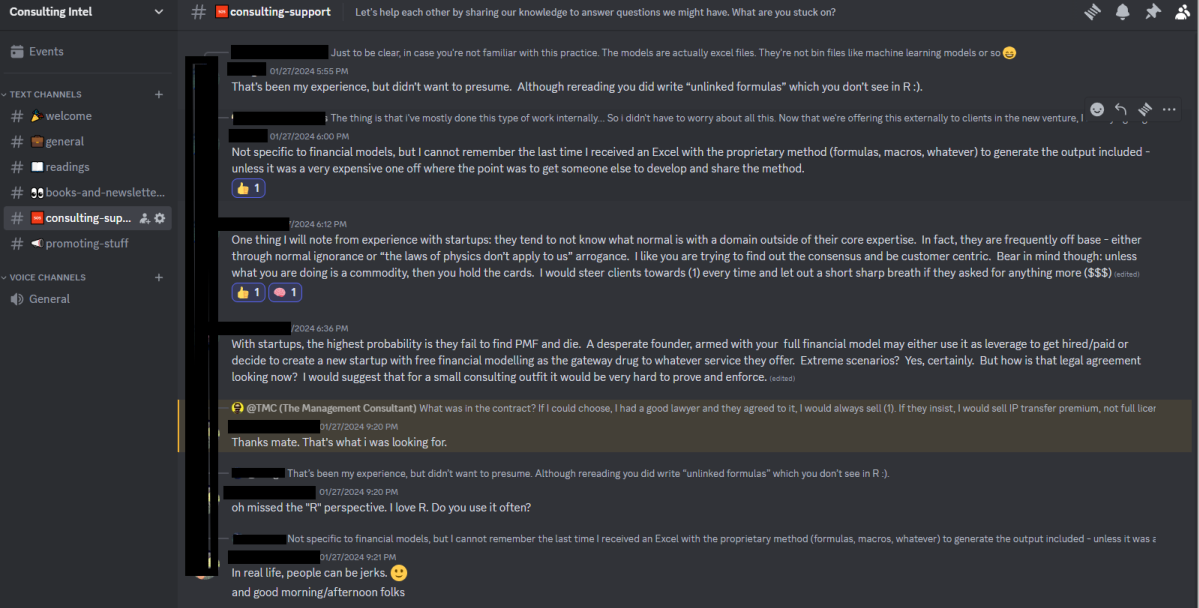To build teams that kick ass you need more than brains
Why we might find out that energy, attitude and chemistry matter more than IQ in consulting
Hello to the 2,115 subscribers who read Consulting Intel!
About ten years ago, I led a core banking transformation project for a major German bank (yes, that one). If you have ever worked in financial services, you know core banking projects are risky as hell. Everything the bank does runs on that system so, when something goes wrong, it can all go wrong.
These kinds of projects either make or break entire careers - both for the executives leading them and the consultants they bring in.
No pressure.
In this case, my client was the CIO of the bank, and the team working with me was a global crew of core banking experts. These were people who had done similar gigs before, many times, all over the world.
Their experience and brains made the project work, but there was also something deeper, something about the team’s energy, the chemistry and everybody’s attitude.
We knew how to solve problems.
We knew how to work together.
Each person had a positive outlook on things, and we genuinely enjoyed working with each other.
Even on the toughest days, we could laugh, joke, and keep things light. We took the work seriously, but not ourselves.
And that’s key.
I believe that balance - the ability to have fun while nailing the task - was fundamental to our success, and I mentioned one of the many fun stories from that period working with that team across Europe in this post below:
What I look for in a team
In Consulting and, more in general, in corporates, there is always a temptation to just hire the brightest minds, the people with the most degrees, the fanciest resumes.
However, my counterintuitive learning from my two decades as a management consultant, is that you can’t build an exceptional team on IQ points alone.
You need something more - something that might surprise you.
Let me share a few thoughts with you, and please let me know in the comments if you agree (or disagree!) with my take.
Problem solvers, not problem finders
Every consulting firm has its share of smart employees who are great at spotting problems: they can analyze the shit out of a situation and tell you exactly what’s wrong.
They are great, but I’m not interested in people who stop there.
I want the ones who, as soon as they see the issue, jump straight onto: “Right, I understand the problem clearly now but how do we fix this?”
Clients need a diagnosis, yes, but what they really are interested in are solutions. I’m sure your team too is full of people who are brilliant at identifying issues but also have a perverse enjoyment in leaving the heavy lifting of finding answers to someone else.
It slows everything down.
One of my former bosses once used a great expression to characterize these people: “Just about anybody can do an audit but it’s harder to do something about the actual problems identified.”
The best teams focus on fixing things, fast.
Resilient optimists
Let’s face it: there are going to be shitty days.
Deadlines will crush you.
Clients will push harder than seems humanly possible.
The work itself will sometimes feel like an endless mountain.
Your boss will make you hate the day you signed that damn contract.
The people I want on my team don’t crumble under that pressure. They bounce back, no matter what, and somehow still keep a smile on their face.
I had one team member like this on that core banking project: a smart, fun and friendly big guy from Georgia (no, not the American state - the country!). Even when things seemed to be falling apart, he kept everyone’s spirits up.
He had the nice habit of reframing setbacks, keeping things positive, and pushing us all forward, me included.
He was not a “blind optimist”, in the sense that he was not out of touch. He just had this knack for seeing a way through when everyone else saw only problems, and he had the remarkable ability to do this with a lightness that made everyone feel good about their work.
Independent thinkers who play for the team
Consulting can be tricky. You need people who can think on their feet, make critical decisions in the moment but also know how to be team players.
You absolutely do not want lone wolves who try to be the hero all the time.
The best consultants know when to lead and when to step back to let the team shine.
I don’t care how smart someone is: if they are a bad fit for the team, it’s not going to work. Consulting is intense. We spend a lot of time together, often in high-pressure situations, and so if someone is constantly causing friction, the whole team suffers.
In the post below, I mentioned the story of Taylor and Rita.
Eventually, in that project we swapped Taylor out for someone who fit the culture better. The difference was night and day.
That’s when I learned that talent, on its own, is not enough.
The Network Alchemists
I know, it is a weird name but these are the people who quietly work magic behind the scenes. They connect ideas and people, and they turn individual brilliance into something much bigger.
These folks are the glue.
They keep the relationships strong, smooth over conflicts and make sure the team works as a cohesive unit.
In my teams, I call them “Network Alchemists”, and I wrote the post linked below to highlight how senior people from the industry that have successfully made the switch into consulting all seem to belong to this category.
Being a Network Alchemist works!!
While I bring the structure and strategy to a project, they bring the human element: the trust, the connections, the collaboration.
Why this works
Consulting is full of smart people.
Everyone’s got degrees, experience and big ideas, but the teams that really deliver have something more.
They share a mindset.
They are resilient, optimistic, and collaborative. They are individual experts working side by side that become a unit, working together towards the same goal.
That’s the kind of team I want to build.
Each person is a star on their own, yes. But together they become unstoppable. And that’s how we consistently deliver, no matter how tough the environment or how high the stakes.
When you do that right, the results speak for themselves.
Every. Damn. Time.
Even with that German client we managed to go live to the exact date planned almost 2 years earlier: something unheard of in programs of that scale and complexity.
Such is the power of building teams where every expert rows in the same direction (unlike what had happened here)…
✍ The Management Consultant
PS: If you like this newsletter, I have one huge favor to ask.
Share it around with friends, family and colleagues.
This is the most effective way to support me (…and to keep me motivated to continue writing 😁).
Thank you 👇👇👇
🎯 INTERESTING SH*T
A couple of things I found on the internet that you may like…
Nik Storonsky (if you never heard his name, he is the founder and CEO of Revolut…) put together his playbook for creating high performance teams (that loosely inspired my post today). It’s a great read, and something I will probably analyze more in depth in the future.
I don’t know about you, but I don’t really like (or trust) Sam Altman from OpenAI, so when I read stuff like this my BS detector goes 🚨🚨🚨🚨🚨🚨🚨🚨🚨🚨🚨🚨🚨🚨🚨🚨🚨🚨🚨🚨🚨🚨🚨🚨🚨🚨🚨🚨🚨🚨🚨🚨🚨🚨🚨🚨
🚨 SPONSORSHIP
More than 2,100 consultants globally read Consulting Intel and rate it a 8.2/10 newsletter!
The readers include management consultants from McKinsey, BCG, Bain, Deloitte, EY, EY-Parthenon, KPMG, PwC, Accenture, Oliver Wyman, PA Consulting, and various boutique consultancies worldwide.
Many corporate employees and independent consultants are regular readers of Consulting Intel.
If you think your products or services could resonate with this audience, get in touch!
👀 JOIN THE DISCORD SERVER
If you like this newsletter, you will love our Discord Server.
In there, you will find a tight-knit community of more than 130 management consultants from all over the world discussing real-life challenges, giving each other support and recommending the good stuff to keep our knowledge top notch.









